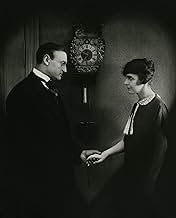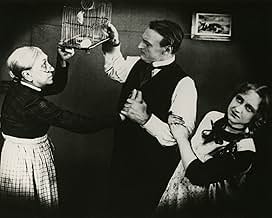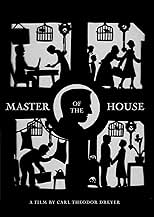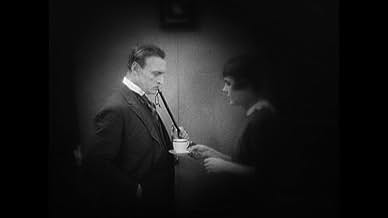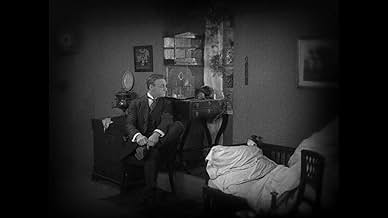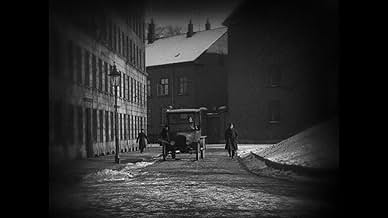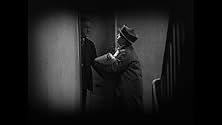IMDb RATING
7.0/10
2.6K
YOUR RATING
When a man becomes tyrannical towards his family, the women of the house decide to teach him a lesson in gratitude.When a man becomes tyrannical towards his family, the women of the house decide to teach him a lesson in gratitude.When a man becomes tyrannical towards his family, the women of the house decide to teach him a lesson in gratitude.
Featured reviews
After seeing this movie (along with many other Dreyer's movies) I still wonder why people think that this Danish director is kind of boring.
This is perfect example of what Dreyer's cinematography is and what is not. This is a film where you can find some gentle spirit lying beneath. Some sort of quietness that fulfils the whole movie. As in many other of his early movies, Dreyer puts the spectator in a superior level. We are given the opportunity to watch an everyday's scene: a woman subjugated to a spoilt man's will. We watch her wake up early in the morning, wash dishes, clean the whole house, prepare her husband's breakfast and all she gets in exchange is bad manners and retreats from him. The complot that the nanny builds up to make the man feel guilty and so, to make him behave, unfolds in a subtle and sometimes funny way, making the watching more enjoyable from the distance.
It's hard to describe the perfect acting that the main characters bring to this beautiful film; an acting full of details and emotion.
Enjoyable form the first frame to the last one, this film will work perfectly for Dreyer's fans as long as for those who ever thought this was a tough one. It's, probably, the perfect bridge to approach to Dreyer's masterpieces such as "Ordet" and "Gertrud".
Hope you like it as much as I did.
This is perfect example of what Dreyer's cinematography is and what is not. This is a film where you can find some gentle spirit lying beneath. Some sort of quietness that fulfils the whole movie. As in many other of his early movies, Dreyer puts the spectator in a superior level. We are given the opportunity to watch an everyday's scene: a woman subjugated to a spoilt man's will. We watch her wake up early in the morning, wash dishes, clean the whole house, prepare her husband's breakfast and all she gets in exchange is bad manners and retreats from him. The complot that the nanny builds up to make the man feel guilty and so, to make him behave, unfolds in a subtle and sometimes funny way, making the watching more enjoyable from the distance.
It's hard to describe the perfect acting that the main characters bring to this beautiful film; an acting full of details and emotion.
Enjoyable form the first frame to the last one, this film will work perfectly for Dreyer's fans as long as for those who ever thought this was a tough one. It's, probably, the perfect bridge to approach to Dreyer's masterpieces such as "Ordet" and "Gertrud".
Hope you like it as much as I did.
"We men are such fools!" proclaims former master of the house Viktor, and you can't help but feel a sliver of guilt as he silently utters those words. That's the timeless universality of film, I suppose: a Danish movie made over 80 years ago is still relevant today.
This was my first Dreyer, and it is quite a light offering considering the man's weighty reputation. It's a social drama with a patently feminist message delivered with a typically heavy hand (by today's standards). Johannes Meyer is Viktor, the decent man turned into a brute by the failure of his business who doesn't realise just how much he takes his long-suffering wife Ida (Astrid Holm) for granted. Fortunately for Ida, Viktor's curmudgeonly former nanny (Mathilde Neilsen), takes control of the situation by packing the frazzled Ida off to a sanatorium so that she can sort Viktor out.
The film drags for the first half-hour as the daily ritual of the Frandsen family is established. Let's face it, there's little of interest in watching people polishing shoes and preparing breakfast, but things get a little more interesting once Nanny takes charge. It's message is a bit too sweeping (although all us men are probably guilty to some degree) and a little too simplistic in its treatment and resolution, but there's plenty on the screen to demonstrate Dreyer's talent as a director - although some symbolism (caged birds, for example) must have been overused even by 1925. A decent enough film, worth watching despite its mundane setting.
This was my first Dreyer, and it is quite a light offering considering the man's weighty reputation. It's a social drama with a patently feminist message delivered with a typically heavy hand (by today's standards). Johannes Meyer is Viktor, the decent man turned into a brute by the failure of his business who doesn't realise just how much he takes his long-suffering wife Ida (Astrid Holm) for granted. Fortunately for Ida, Viktor's curmudgeonly former nanny (Mathilde Neilsen), takes control of the situation by packing the frazzled Ida off to a sanatorium so that she can sort Viktor out.
The film drags for the first half-hour as the daily ritual of the Frandsen family is established. Let's face it, there's little of interest in watching people polishing shoes and preparing breakfast, but things get a little more interesting once Nanny takes charge. It's message is a bit too sweeping (although all us men are probably guilty to some degree) and a little too simplistic in its treatment and resolution, but there's plenty on the screen to demonstrate Dreyer's talent as a director - although some symbolism (caged birds, for example) must have been overused even by 1925. A decent enough film, worth watching despite its mundane setting.
The story of a "spoilt husband" - selfish, irritable, very ill-tempered and demanding as he rules the house, while his patient/devoted wife gets up at the crack of dawn to start her drab day of tending to his constant needs and complaints. Even the kids have to perform tasks all day rather than play to satisfy their tyrant of a father - but he's NEVER satisfied, nothing seems to be to his liking! Yeah, you got it, this guy is a serious jerk leaving me to wonder why the wife hasn't left him long ago. Luckily smart Nana, hubby's childhood nursemaid, steps up to the plate to help make some changes as she fetches the wife's mother and the two old women set out to straighten this guy out and teach him the lesson he so badly needs - to appreciate his wife. So the wife goes away for a "rest" (well needed, I should say) leaving hard-nosed Nana in charge of the brute!
This film is adequately entertaining, it is photographed in an interesting way, but is somewhat slow-moving and drags a bit in places. I would say at least half an hour shorter would have made this a better film. The acting is quite well done by all players. The version as shown on TCM included a pleasant piano score that sometimes suits the plot - and sometimes doesn't. Worth seeing.
This film is adequately entertaining, it is photographed in an interesting way, but is somewhat slow-moving and drags a bit in places. I would say at least half an hour shorter would have made this a better film. The acting is quite well done by all players. The version as shown on TCM included a pleasant piano score that sometimes suits the plot - and sometimes doesn't. Worth seeing.
...that explores the deterioration of a relationship of a husband and wife in Denmark after the man has lost his business. He becomes, not only morose, but extremely nasty towards his entire family, channeling all of his own personal misery towards his wife, his mother-in-law, his children, and his former nanny.
The first half of this film will win few viewers' sympathy concerning the husband. Frankly, in most of today's world, especially in the USA, any wife would have walked long ago rather than put up with such abuse. Instead, we see a form of mores that existed in a culture of yesterday, where this particular wife still holds great affection for her husband. Carl Theodore Dreyer does a commendable job showing the breakdown of the situation into its component parts, the breakup of the relationship, not by the wife, but by the nanny and mother-in-law, and then the re-assembling of the pieces into a concordant whole again. It's beautifully done, but it's dated. The major star of the piece is Mathilde Nielsen who plays the former nanny of the husband. Her eyes alone are worth the show.
This is well worth the watch but be forewarned that this is not necessarily a very pleasant piece, and I found as much to frown as to smile about.
The first half of this film will win few viewers' sympathy concerning the husband. Frankly, in most of today's world, especially in the USA, any wife would have walked long ago rather than put up with such abuse. Instead, we see a form of mores that existed in a culture of yesterday, where this particular wife still holds great affection for her husband. Carl Theodore Dreyer does a commendable job showing the breakdown of the situation into its component parts, the breakup of the relationship, not by the wife, but by the nanny and mother-in-law, and then the re-assembling of the pieces into a concordant whole again. It's beautifully done, but it's dated. The major star of the piece is Mathilde Nielsen who plays the former nanny of the husband. Her eyes alone are worth the show.
This is well worth the watch but be forewarned that this is not necessarily a very pleasant piece, and I found as much to frown as to smile about.
Exceptional because 90% of the story is set in an apartment but does not bore the viewer.The main credit to the movie should go to the writers.Although the story is mainly serious many of the lines show well thought out humor.It's already been brought out how the film is a step back in time showing how a typical Danish family might of went about doing daily chores in that era.At times it has the look of being filmed for future generations to study.Seeing a person carrying a tub of clothes up a few flights of stairs can generate a lot of appreciation for a clothes dryer.The few outdoor scenes were of interest also as they reflected a lifestyle of the past.Yes the story is of a a bad husband/father mistreating the family.To add to his fearful image he seems to be a huge man.This may be best noted in a closeup scene of his hand and the oldest daughter's hand together,the difference in size is great.The emphasis on his being a tyrant is great also but quite believable.The wife's slave like existence is laid on thick and is not quite so believable.The doubt here being brought about by her total lack of verbal response to the husbands unreasonable comments.She just puts her head down and obeys.Her role is almost 100% fairytale like.Compared to her Cinderella might seem sassy.The mentioning of the wife's lack of protest is an observation not an criticism (it's not easy to make that sound right).Anyone with only a slight interest in this subject matter will probably still be entertained by this movie.
Did you know
- TriviaAt its original release in Paris, France, this film played in 57 theaters in three weeks.
- Quotes
Opening Title Card: In the numerous streets of the Big City, house follows house, and in those houses, people live in layers - like wild birds carving their nests into the rock... nest above nest...
- Alternate versionsA 107-minute version with English intertitles and an uncredited piano score was shown on the Turner Classic Movies (TCM) channel in 2006. It had no crew credits other than the director (as Carl Dreyer) and only three cast members: Johannes Meyer (as Johs Meyer), 'Astrid Holm' and Mathilde Nielsen. The English names used were John and Mary for the husband and wife, presumably to indicate a typical family, and "Nana" for the Wetnurse. The two older children were called Kathleen and Dick.
- ConnectionsEdited into Mathilde Nielsen - Kavalkade (1941)
- How long is Master of the House?Powered by Alexa
Details
- Release date
- Country of origin
- Language
- Also known as
- Master of the House
- Production company
- See more company credits at IMDbPro
- Runtime
- 1h 51m(111 min)
- Sound mix
- Aspect ratio
- 1.33 : 1
Contribute to this page
Suggest an edit or add missing content

